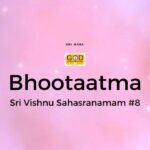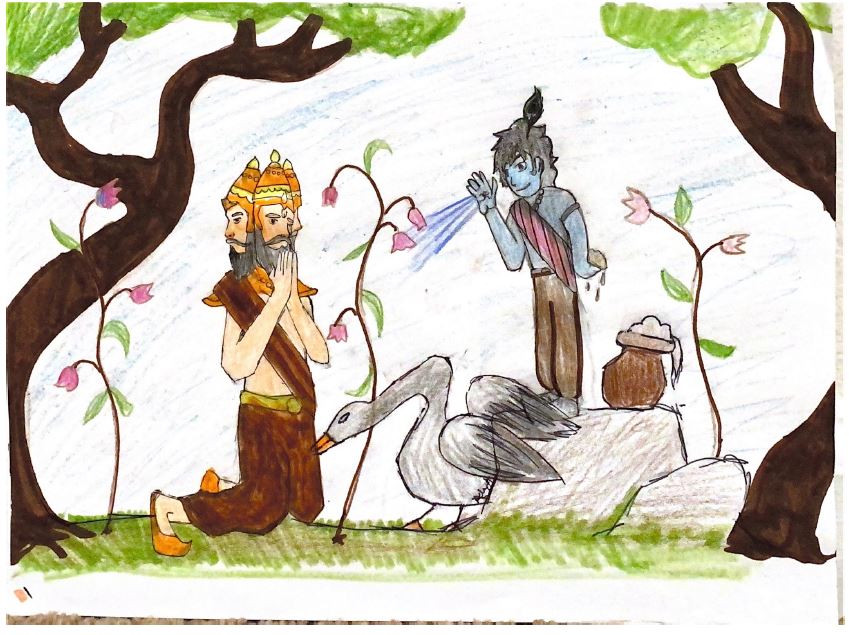We human beings are, in general, a rather confused lot. We always tend to mix up things… do one thing where something else should be done and vice versa. And in the realm of spirituality, this is even more true.
 The great saint, Purandara Dasa, who actually saw and communed with God, sings to us with great emotion, “Nara janma bandaaga naalige iruvaaga Krishna ena baaradey! Krishna endare sakala kashtavu parihaara, Krishna ena baaradey!”
The great saint, Purandara Dasa, who actually saw and communed with God, sings to us with great emotion, “Nara janma bandaaga naalige iruvaaga Krishna ena baaradey! Krishna endare sakala kashtavu parihaara, Krishna ena baaradey!”
“You have got a human birth [which is so rare]! You have a tongue and can speak! Will you not then say ‘Krishna’? If you say ‘Krishna’, all your troubles will go away! Will you not say ‘Krishna’?”
And what do we do when we listen to this song? We say of the singer, “What a soulful rendition! What emotion when she sings! What a raga!” We even say, “O what a beautiful song! How wonderfully Purandara Dasa has composed it. What a deep meaning!”
But do we immediately start chanting Krishna’s name? No.
Sri Adi Shankara, the great Acharya, an avatara purusha (incarnation of God Himself) who went all around India re-establishing the greatness of Sanatana Dharma, and who composed so many songs, slokas and treatises, sings, “Bhaja Govindam, bhaja Govindam, Govindam bhaja moodha mathe!”
Here the Acharya does not stop with entreating us like Sri Purandara Dasa did in the previous song. Sri Adi Shankara literally gives us a blow here! He says, “Sing Govinda’s name, sing Govinda’s name, sing Govinda’s name, you fool!”
Yet, this affront too passes us by, thick-skinned and dull-headed as we are. We say, “Oh what a lovely song. How wonderfully MS has sung it! What ‘bhava’!” We listen to the song, admire its musical and lyrical beauty, teach it to our children, even sing the phrase “moodha mathe” (meaning ‘one with a dull intellect’, in other words, a fool!) with all earnestness and seriousness, completely unaware that that is exactly what we are exhibiting by focusing only on the song’s musical aspect while ignoring its original intent.
And after so much glorification of this song, do we sing Govinda’s name? No.
Guru Nanak ji’s “Sumiran kar le” bhajan is very well known, made popular by famous ghazal singers. In this song, under the pretext of speaking to his own mind, Nanakji actually tells our minds, “Sumiran kar le mere mana teri beeti umar Hari naam bina! Koop neer bina; dhenu ksheer bina; dharti megh bina; jaise taruvar phal bin heena; taise praani Hari naam bina!”
“Chant the Name of Hari, O Mind; See, your life wastes away without Hari’s Name! A well without water; a cow without milk; the earth without rain and clouds; the tree without fruit – such is a man who does not chant the Name of Hari!”
Again, when we listen to this song, what do we do? We praise the singer; we praise the song’s poetic beauty. We may even admire the song’s profound meaning or speak of the greatness of the mahatma who composed it.
But do we immediately start to chant the name of Hari? No.
It is not just with music and kirtans that we choose to overlook the essence. We do the same even with pasurams, slokas and stotras that we recite frequently.
Kulasekhara Azhwar, in his celebrated Mukunda Mala stotram says,
“tattvam bruvanAni param parastan, madhu ksharantiva mudAvahAni
pravartaya pranjalir asmi jihve, nAmAni nArAyana-gocharAni”
“My dear tongue, I stand before you with joined palms and beg you to chant the names of Lord Narayana. These names describing the Supreme Absolute Truth bring great pleasure, as if exuding honey.”
and again he says:
“shatru chedaika mantram sakalam upanishad vAkya sampUjya mantram
samsArOchcheda mantram samuchita tamasah sangha niryANa mantram
sarvaishvaryaika mantram vyasana bhujaga sandashta santrAna mantram
jihve sri Krishna mantram japa japa satatam janma sAphalya mantram”
“O tongue, please constantly chant the mantra composed of Sri Krishna’s names. This is the only mantra for destroying all enemies, the mantra worshiped by every word of the Upanishads, the mantra that uproots samsara, the mantra that drives away all the darkness of ignorance, the mantra for attaining infinite opulence, the mantra for curing those bitten by the poisonous snake of worldly distress, and the mantra for making one’s birth in this world successful.”
We chant such verses often without knowing what the Mahatma who composed it is saying. Or even if we do take the trouble to find out the meaning, do we immediately start to constantly chant Krishna’s name? No.
Lord Shiva Himself says to Parvati Devi, “srI rAma rAma rAmeti rame rAme manOrame, sahasranAma tattulyam rAma nAma varAnane.”
“I constantly chant the name of Rama and enjoy its bliss. Chanting this holy name – Rama – once, is equal to chanting the Vishnu Sahasranama (1000 names of Lord Vishnu).”
We all know this verse and even chant it thrice for emphasis while chanting the Vishnu Sahasranama. But, realizing the verse’s implication, do we begin to then chant the Rama Nama constantly? No.
A truly unfortunate lot are we, whose minds and tongues – despite all the declarations, assertions, entreaties, promises, rebukes, and even threats, of hundreds of Mahatmas who exhort us to constantly chant the Divine Name – refuse to take refuge in the simple, yet All-Powerful Holy Name!
Nisha Giri, Houston, TX






